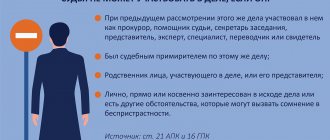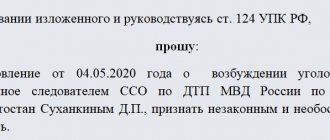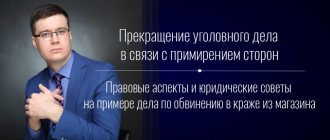Commentary on Article 67 of the Code of Criminal Procedure of the Russian Federation
1. This article deals with the recusal of only the investigator or interrogating officer, however, in the general sense of the law, a recusal can also be declared to other employees of the inquiry body, other officials who have been granted the powers of the inquiry bodies in accordance with Art. 40 when carrying out urgent investigative actions (Article 157), as well as officials of the body carrying out the operational investigation, attracted by the investigator to participate in the investigative action in accordance with Part 7 of Art. 164. On the recusal of the head of the Investigative Committee, see Determination of the Constitutional Court of the Russian Federation of December 16, 2008 N 1080-O-P.
2. An application for recusal or self-recusal of an investigator or interrogating officer, which has the form of a separate procedural document, is attached to the materials of the criminal case, and an oral statement is entered into the protocol of an investigative or other procedural action. If the requested challenge is satisfied, the head of the investigation department or the prosecutor removes the investigator or interrogating officer, respectively, from further investigation (clause 10, part 2, article 37; subclauses 5, 6, part 1, article 39).
3. It seems that if the investigator and the interrogating officer, upon discovery of the relevant grounds, do not recuse themselves, and other participants in the process do not make statements about their recusal, then, accordingly, the head of the investigation or the prosecutor has the right to raise and resolve this issue on their own initiative (see also paragraph 3 com to Article 62).
4. Part 2 art. 41 provides another basis for the recusal of the investigator - his carrying out operational investigative activities in this criminal case.
Lawyer's statement about challenges
Chapter 9 of the Code of Criminal Procedure of the Russian Federation names the circumstances that exclude the participation in criminal proceedings of a judge, prosecutor, investigator, inquiry officer, court secretary, translator, expert, specialist, representative of the victim, civil plaintiff or civil defendant. If there are grounds for challenge, these persons are obliged to withdraw from participation in the criminal proceedings. If this does not happen, they may be challenged by the defense attorney (Part 3 of Article 62 of the Code of Criminal Procedure of the Russian Federation).
Lawyer's petition
Petitions are justified requests from participants in the process addressed to an authorized official or body to carry out any procedural action or to refrain from carrying it out, submitted in the manner prescribed by law, orally or in writing [1].
In accordance with Art. 119 of the Code of Criminal Procedure of the Russian Federation, the defense attorney of the accused (suspect) has the right to file a petition to carry out procedural actions or make procedural decisions to establish circumstances relevant to the criminal case, ensure the rights and legitimate interests of the person he represents.
The lawyer's petition should concern only circumstances that exonerate the accused or mitigate his guilt. In addition, they must be declared on time, i.e. should not be postponed to subsequent stages of the investigation, especially if there are grounds for terminating the criminal case or reclassifying the charges, or changing the preventive measure. However, practice shows that the number of submitted applications is small.
This can be explained by the following reasons: 1) the resolution of the petition depends entirely on the body in charge of the criminal case; 2) insufficient motivation of the application.
The reason for the low activity of the defense lawyer during the preliminary investigation is not only that his petitions are often rejected, but the defense lawyer himself often considers the application of a petition aimed at eliminating shortcomings in the investigation to be unprofitable, since from his point of view such a petition is more effective in the court that will consider its more objective.
There is also a point of view that deciding when to file a motion is the prerogative of the defense attorney and is determined by the defense tactics he uses [2]. However, this is not always true, since it is quite obvious that the lawyer’s petition, aimed at eliminating the investigator’s shortcomings, must be submitted at the stage of the process when the grounds for such a petition have become known. After all, investigative actions may be necessary to correct an error discovered by the defense attorney. Moreover, requests to conduct this kind of investigative actions must be submitted without fail, since otherwise the requirements of Article 53 of the Code of Criminal Procedure of the Russian Federation, which obliges the defense attorney to use all the means and methods of defense specified in the law, will not be met.
Another comment on Article 67 of the Code of Criminal Procedure of the Russian Federation
1. The preliminary investigation, carried out by the investigator and the inquiry officer, is one of the main stages of legal proceedings in most criminal cases, the main purpose of which is to ensure conditions for the effective administration of justice in criminal cases (Resolution of the Constitutional Court of the Russian Federation of March 23, 1999 N 5-P on the case of verification constitutionality of the provisions of Article 133, Part 1 of Article 218 and Article 220 of the Code of Criminal Procedure of the RSFSR // Supreme Court of the Russian Federation, 1999. No. 4). Thus, the results of not only the preliminary investigation, but also the criminal proceedings as a whole, largely depend on the investigators and interrogators carrying out the preliminary investigation, who are authorized to independently carry out criminal procedural actions and make decisions on the case, which determines the requirements of objectivity and impartiality for them. .
2. The previous participation of an investigator or inquiry officer in a previously conducted preliminary investigation or inquiry in the same case is not a basis for his recusal. The fact that he, as an investigator, previously conducted an inquiry into the case does not prevent the investigator from carrying out an investigation into the case.
3. At the same time, the investigator cannot participate in the preliminary investigation of a criminal case if he previously carried out operational search activities in connection with this case (see commentary to Article 41).
4. In itself, a statement to challenge an investigator or interrogating officer (before the prosecutor makes a decision on it) does not entail their removal from participation in the case and the suspension of investigative and other procedural actions.
Recusal application
A petition to disqualify an investigator is submitted to an official who has administrative functions for the removal of an investigator. These officials can be either the prosecutor or the head of the investigative department or inquiry department.
It is allowed to submit a petition to the investigator or interrogating officer himself so that he can independently submit the petition for consideration by the above-mentioned officials.
In order to clarify all the circumstances referred to by the person filing the challenge, the prosecutor or the head of the investigation may conduct interviews with the applicant.









